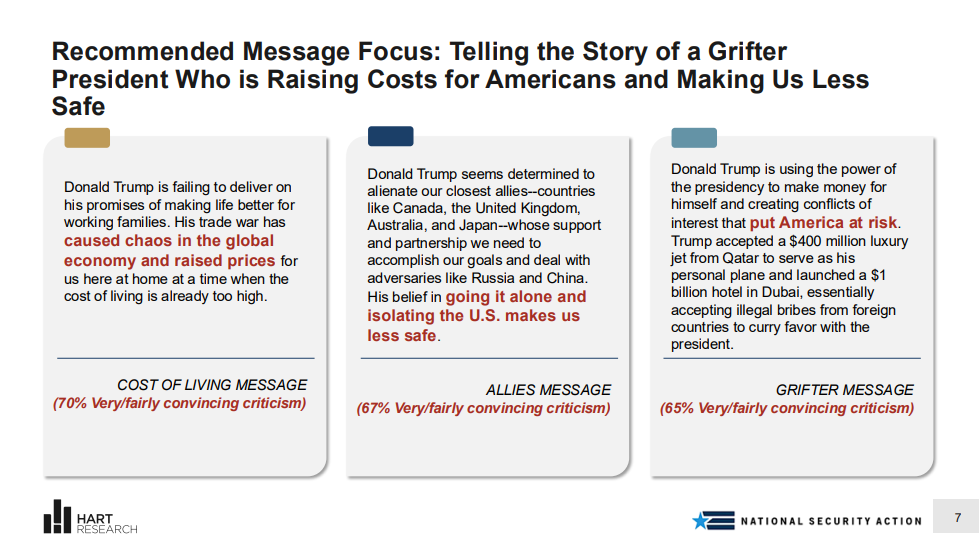Criticisms of Donald Trump resonate differently depending on voters’ partisan leanings and political engagement
AUGUST 2025
This document summarizes key findings from six online focus groups conducted by GBAO for National Security Action in August 2025. Participants included Democrats, Republicans, and Independents – all of whom follow U.S. foreign policy at least occasionally. All participants reside in Georgia, Iowa, Maine, Michigan, Minnesota, Nebraska, North Carolina, New Hampshire, Ohio, or Texas.
KEY FINDING:
Democratic voters remain deeply concerned about Trump’s abuse of power and disregard for legal and institutional norms. A Democrat from Michigan, explained “Everything is predicated on the rule of law. Everything falls apart without it. If you're not going to play by the rules, then nothing else matters. Nothing.”
However, less politically engaged voters and independents appear more focused on his broken promises – particularly around the economy and inflation. “Things aren't cheaper. It's still just as difficult to buy groceries. You get like five bags of groceries, it’s like $100, you know?” explained an Independent voter from North Carolina. Among these groups, there is strong disappointment with Trump’s failure to lower costs or deliver tangible benefits to working people, with many perceiving his policies as favoring Wall Street over Main Street.
While voters broadly assume that most politicians engage in some level of self-enrichment, Trump’s corruption and self-dealing is in a category of its own. There is a prevailing belief that he governs primarily out of self-interest, making decisions based on personal profit rather than the national good. A Texas Republican, stated “I just don't feel like he has America's interests at heart. He has Trump's interests at heart. Everything's a business deal.” Voters are not necessarily surprised by his desire to benefit financially from the presidency – but they are increasingly frustrated by it. Across various demographics, Trump’s apparent prioritization of his own bottom line is emerging as a political vulnerability.
The partisan alignment of these critiques closely matches messages that were tested in National Security Action’s summer poll:
MORE FROM VOTERS:
“For me, one of Trump's biggest selling points was like, the economy was so expensive under Biden. Trump's gonna make things better. He's gonna fix the economy… But none of that has happened. Everything is still expensive. These tariffs are probably going to make things even more expensive. I don't see how the average American is benefiting under Trump, what he’s selling. (Georgia Democrat)
“He’s not living up to his promise on worrying about Main Street instead of Wall Street and making his buddies richer. He should be focusing on the regular folks.” (Texas Republican)
“I think as is true with all things, Trump is mostly prioritizing himself and whoever is backing him. So yeah, I really think he's just in it for his own best interest.” (Nebraska Democrat)
TAKEAWAYS:
There is no one-size-fits-all criticism of Donald Trump that resonates equally across all voting blocs. Voters bring different priorities and levels of political engagement to the table, which shape how they interpret and respond to critiques. However, several consistent patterns emerge that can help guide message targeting.
Politically engaged Democratic voters are particularly attuned to concerns about Trump’s disregard for democratic norms and the rule of law, viewing these actions as a long-term threat to American institutions. In contrast, less politically engaged voters – and those outside the Democratic base – are more focused on Trump’s broken promises, especially his failure to deliver economic relief or lower costs for working families.

